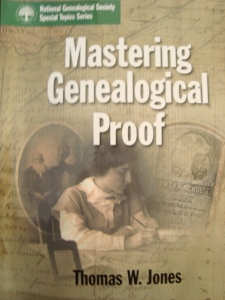 |
| Published by NGS |
Defining genealogy can be problematic. Here in the UK genealogy is typically taken to be the linage of individuals whereas family history is the "fleshing out" of those pedigrees.
Genealogy is about reconstructing pedigrees, typically forgotten or unknown relationships but of course can include individuals that are known to the pedigree creator, living individuals,adoptive lineage and martial family.
As someone who is conducting two one-name studies registered with the Guild of One Name Studies and three one-place Studies registered with the Society for One-Place Studies I also use pedigrees to establish lineage between individuals that are not related to me. As I am a visual person, I also use pedigrees to trial a hypothesis
Genealogy is multi disciplinary. It draws its knowledge base from many other fields such as anthropology, genetics, law, economics and sociology.
Other references - http://www.bcgcertification.org/resources/standard.html (accessed 23rd February 2014)
Genealogy is about reconstructing pedigrees, typically forgotten or unknown relationships but of course can include individuals that are known to the pedigree creator, living individuals,adoptive lineage and martial family.
As someone who is conducting two one-name studies registered with the Guild of One Name Studies and three one-place Studies registered with the Society for One-Place Studies I also use pedigrees to establish lineage between individuals that are not related to me. As I am a visual person, I also use pedigrees to trial a hypothesis
Genealogy is multi disciplinary. It draws its knowledge base from many other fields such as anthropology, genetics, law, economics and sociology.
Genealogy uses a variety of sources, which were devised and used by other disciplines, organisations and processes such as legal, demographic, governmental, medical, religious and many more.
As a research discipline genealogy, has it's own standards and skill set.
There are five elements for Genealogical Proof Standards:
- Thorough research
- Informative
- Analysis and Comparison
- Resolution
- Written Statement, list or narrative
All of this five elements are required and therefore proof can not be partial proved.
How do you know though, that you have conducted a "reasonably exhaustive search"? Michael Hait from MGP 1 stated in last year's video "reasonably exhaustive search is when you have enough evidence to prove your conclusion"
How do you know though, that you have conducted a "reasonably exhaustive search"? Michael Hait from MGP 1 stated in last year's video "reasonably exhaustive search is when you have enough evidence to prove your conclusion"
Removal of the evidence and statement of facts is detrimental to the integrity of the genealogical research undertaken. The research therefore does not have providence to support the claim the researcher is claiming.
The first stages in research is to ask questions about the individual we are researching. Who, What, Where, When & How.
You can watch the discussion of Chapter one HERE
Other references - http://www.bcgcertification.org/resources/standard.html (accessed 23rd February 2014)
 |
| Image courtesy of Dear Myrtle |
Hi, Julie,
ReplyDeleteI am viewing MGP 2 (having viewed last years MGP 1), and it's good to get the British viewpoint.
Canada (where I live) is an "in-between" country. It's genealogy practices are somewhere between those of Britain, the United States, and Australia. We place more emphasis on census rather than Australia which places more emphasis on vital records, as I understand it. But then again, not so much on One Name Studies and One Place Studies as is popular in Britain.
Hope you join the discussion again next Sunday so that I can learn more!
Elizabeth
www.genealogycanada.blogspot.com
Well stated. The last line is a good point to start from.The 4 "W"s and How is a must in any research and writing.
ReplyDeleteWell stated. Especially the last line. The 4"W"'s and How is a must in any research and writing. Thank you for sharing.
ReplyDeleteIt's interesting to learn what steps bloggers take when they research their family history. I read a lot of blogs like this, and it always fascinates me. I often wonder how they do what they do, and where they get their next lead. This post is really helpful, and will make it easier to understand how much goes into their work.
ReplyDeleteMJ, A to Z Challenge Co-Host
Writing Tips
Effectively Human
Lots of Crochet Stitches